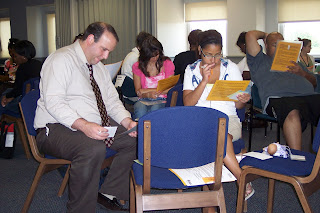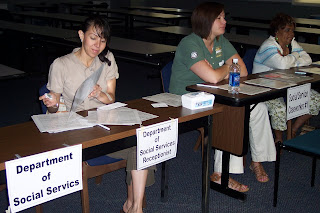
On Friday afternoon, Mercy College and Ohio Association of Second Harvest Food Banks hosted a Poverty Simulation at Mercy College in Toledo.
A Poverty Simulation is an interactive event that helps participants understand what life is like with a shortage of resources and an abundance of stress.
We had about 30 people attend. Each person was assigned an identity and got a packet with information about themselves and their family group. Included in the packet were any resources the family had, like cash, transportation passes, food stamps, social security cards, household goods, etc.
Every family was different and had different circumstances, but each had to figure out how to feed their family, pay their bills, and get around to different appointments or businesses during the simulation's four, 15-minute "weeks."
I participated in a poverty simulation back in December, but this time I got to see it from the other side of the table -- playing the role of a community agency or business that the participants would need to visit to accomplish their tasks.
I was the bank. Here's me with my money pouch.

More people were cashing checks than paying off loans, so I ran out of cash pretty quickly. There was a lineup of people needing money, so I started "minting" money to meet my demand. Pretty sure that's illegal, but hey.

Other busineses included:
 The General Employer, aka the workplace where all adults with jobs had to go and sit for 7 minutes each "week" in order to get paid. This is Amy, my replacement VISTA for next year at the Food Bank in Toledo.
The General Employer, aka the workplace where all adults with jobs had to go and sit for 7 minutes each "week" in order to get paid. This is Amy, my replacement VISTA for next year at the Food Bank in Toledo. Quik Cash, aka check cashing with interest and transportation passes for purchase. This is Kylee, another new VISTA at the Food Bank in Toledo.
Quik Cash, aka check cashing with interest and transportation passes for purchase. This is Kylee, another new VISTA at the Food Bank in Toledo. Social Services, aka Job and Family Services (for food stamps, welfare). This is Veronica, a VISTA from Advocates for Basic Legal Equality in Toledo; Maureen, who is going to hate this picture; and a volunteer from the community.
Social Services, aka Job and Family Services (for food stamps, welfare). This is Veronica, a VISTA from Advocates for Basic Legal Equality in Toledo; Maureen, who is going to hate this picture; and a volunteer from the community. School/Day Care, where all the kids had to go or risk getting in trouble for truancy. This is a volunteer from the community.
School/Day Care, where all the kids had to go or risk getting in trouble for truancy. This is a volunteer from the community. Pawn Shop, including Guns For Sale. This is one of the new VISTAs from the Food Bank in Lima.
Pawn Shop, including Guns For Sale. This is one of the new VISTAs from the Food Bank in Lima. Utility Company. This is Ina, one of the new VISTAs from the Food Bank in Lima.
Utility Company. This is Ina, one of the new VISTAs from the Food Bank in Lima. Community Action Commission, aka a resource for food vouchers and free bus passes. The CAC is one of those hidden resources in a community. Most people were buying bus passes from Quik Cash and didn't realize or think about visiting the CAC where they could have gotten bus passes for free. This is one of the new VISTAs at the Food Bank in Lima.
Community Action Commission, aka a resource for food vouchers and free bus passes. The CAC is one of those hidden resources in a community. Most people were buying bus passes from Quik Cash and didn't realize or think about visiting the CAC where they could have gotten bus passes for free. This is one of the new VISTAs at the Food Bank in Lima. Grocery Store. This is Jacki from WSOS community action commission in Fremont.
Grocery Store. This is Jacki from WSOS community action commission in Fremont. Beth (Oak Harbor High School graduate and VISTA at WSOS in Fremont) was the sheriff. Sharon (VISTA at the Food Bank in Lima), looking appropriately shady in the back, was the "criminal element" of the simulation. Her job was to deal drugs, swipe any cash or household items left unattended, and generally create an element of chaos. Sharon, who is very sweet and unassuming in real life, was surprisingly good at this! Also, by the end, Beth the sherriff in cahoots with Sharon the criminal. I personally witnessed several illicit transactions. Police corruption!
Beth (Oak Harbor High School graduate and VISTA at WSOS in Fremont) was the sheriff. Sharon (VISTA at the Food Bank in Lima), looking appropriately shady in the back, was the "criminal element" of the simulation. Her job was to deal drugs, swipe any cash or household items left unattended, and generally create an element of chaos. Sharon, who is very sweet and unassuming in real life, was surprisingly good at this! Also, by the end, Beth the sherriff in cahoots with Sharon the criminal. I personally witnessed several illicit transactions. Police corruption!If people didn't pay their rent or mortgage on time, they got evicted.

Sometimes agencies were randomly closed.

 Beth had a gun and handcuffs...
Beth had a gun and handcuffs... ...and she wasn't afraid to use them. This family was in trouble with the law practically the entire time, this time for their child's truancy.
...and she wasn't afraid to use them. This family was in trouble with the law practically the entire time, this time for their child's truancy.At the end of the hour, we had a group discussion where everyone shared how their family fared during the simulation and any thoughts about the experience they wanted to share.

It was a lively discussion. Comments included:
Wow I learned a lot. This was hard!
I can see now that there were better ways to do things. But you don't always think clearly when everything is happening all at once and your kid is in jail and you're getting evicted and bills are piling up and you just lost your job.
Several people commented on the frustration of transportation passes. Each time you visited an office you had to surrender one. So going here and there trying to figure out the right process or office, or having to come back for another appointment cost you a pass each time.
One man noted that it's all about timing -- if he would have understood the system from the start and handled things in a different order, he might have come out even or possibly ahead. But a few mistakes and missteps compounded and he ended up losing his job for being late, which left him with no money to buy bus passes to go find a new job or for his kid get to school so he gets arrested for truancy issues, and so on. I didn't realize I could get fired in this simulation! he said.
Be your own advocate, be informed and refuse to be a victim, and that can not only help you but empower and teach those around you. Many low-income families believe what authorities tell them. For example, several families got evicted and accepted it. But, in reality, it's illegal to evict someone with no warning and they should have called the mortgage company out on that. Only one woman thought to protest the eviction.
One woman commented that she felt low-income men trying to raise children alone are at a disadvantage because many social services are set up to help women and children, and the man may not have the benefit of "knowledge of the system" passed down matralinerally through the generations.







Great Blog Sarah! I love those poverty simulations and wish more political figures would take part in them. I really think we need to take this to the Senate and the Congress and make them take part in it just so they can see what people go through every single day!
ReplyDelete